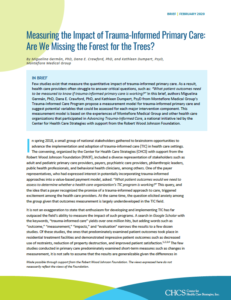
Many trauma-informed care (TIC) programs focus on upstream variables such as changing provider behavior and developing workforce wellness practices, yet the evaluation of health care interventions are traditionally oriented toward impact on patient outcomes. While patient outcomes are a significant driver in the development of TIC programs, health care organizations implementing trauma-informed approaches can benefit by thinking more broadly about how to measure program success. By focusing only on the trees (i.e., patient outcomes) when evaluating TIC programs, are evaluations missing critical parts of the forest?
In this brief, authors Miguelina Germán, PhD, Dana E. Crawford, PhD, and Kathleen Dumpert, PsyD from Montefiore Medical Group’s Trauma-Informed Care Program propose a measurement model for trauma-informed primary care and suggest variables that could be assessed for each major intervention component. Their recommendations include: (1) measuring all major TIC program components and ensuring that the measurement conceptually links to actual intervention activities; and (2) avoiding only measuring patient-level outcomes. This measurement model is based on the experiences of Montefiore Medical Group and other health care organizations that participated in Advancing Trauma-Informed Care, a national initiative led by the Center for Health Care Strategies with support from the Robert Wood Johnson Foundation.